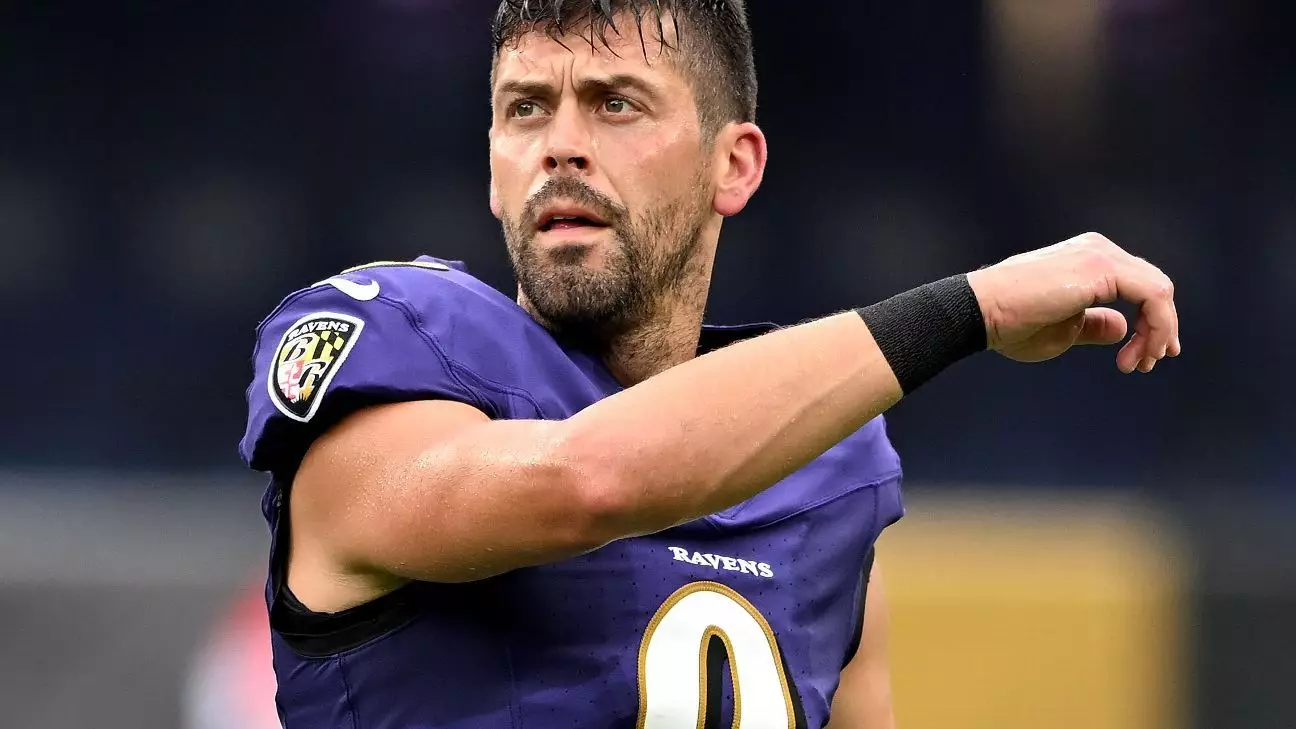The recent suspension of former Baltimore Ravens kicker Justin Tucker shines a harsh spotlight on the NFL’s ongoing struggle with handling allegations of personal misconduct. A 10-week suspension for multiple accusations of sexual misconduct reported by sixteen massage therapists over a four-year span feels markedly inadequate given the gravity and volume of the claims. The league’s decision—permitting Tucker to remain free to sign with another NFL team and participate in training camp prior to the suspension—reveals an unsettling leniency that risks trivializing the lived experiences of the victims.
Tucker, while once celebrated as the NFL’s most dependable kicker, now faces a fall from grace colored not just by a decline in performance but by a moral and ethical reckoning. The fact that all reported misconduct occurred early in his career, yet are only addressed more than a decade later, points to a broader issue within professional sports: the systemic sluggishness in confronting and substantiating abuse claims against star athletes.
Victims’ Voices vs. Star Athlete Privilege
The responses from those who came forward underscore a profound disconnect between institutional disciplinary action and victim justice. One massage therapist’s statement that “he got 10 weeks, and we have to deal with this the rest of our lives” encapsulates this gap. Many victims in high-profile abuse cases do not seek merely punishment in the traditional sense but long for meaningful recognition and acknowledgment of the harm endured.
By contrast, Tucker and his representatives have maintained unequivocal denials, casting the allegations as “false” and driven by tabloid sensationalism. This defensive posture, which the attorneys representing the victims characterize as further victimization, perpetuates the entrenched culture where powerful men deny responsibility rather than make amends. This refusal to acknowledge wrongdoing, even as evidence and testimonies emerge, raises questions about accountability and the sincerity with which athletes confront their off-field conduct.
A Career Overshadowed: Performance Declines and Ethical Failures
What complicates Tucker’s legacy is how his recent NFL performance underwhelmed expectations relative to his prior brilliance. Coming off the worst season of his career—missing a career-high number of kicks—Tucker’s on-field troubles have coincided with the allegations surfacing, creating a narrative of overall decline. However, this overlap should not elicit sympathy or protect him from full accountability. Rather, it highlights that athletic prowess offers no immunity from ethical lapses.
The Ravens’ decision to release Tucker despite three years remaining on a lucrative contract sent a powerful message: moral conduct matters as much as performance. Yet, the NFL’s handling of the suspension somewhat undercuts this message by allowing a potentially swift return to play, effectively downplaying the severity of the personal conduct breach.
Systemic Reflections on League Culture and Policy
This episode spotlights the deeper, systemic challenges facing the NFL: how to balance talent and marketability against ethical standards and victim rights. The league’s personal conduct policy is meant to uphold integrity, but its enforcement often appears piecemeal, reactive, or superficially calibrated to preserve player market value and brand image.
The public, and especially the marginalized workers involved, deserve more than a cold middle ground that sanctions the accused just enough to appear “doing something” while still protecting their careers and financial futures. True reform requires that leagues like the NFL confront the realities of pervasive misconduct with sustained, transparent, and survivor-centered responses. It also demands cultural shifts away from hero worship toward a more nuanced appreciation that players’ actions off the field carry significant consequences and cannot be measured merely by game-day statistics.
The Need for Genuine Accountability Beyond Suspensions
Ultimately, the NFL’s approach to Justin Tucker’s case reflects a broader societal struggle: how institutions handle accusations of sexual misconduct against powerful men in high-profile professions. A suspension measured in weeks, without accompanying reparations or meaningful acknowledgment, feels more like a bureaucratic checkbox than a reckoning.
To truly honor victims, organizations must move beyond token punishments and defensive spokesperson statements. They must enforce policies that prioritize integrity over profits and respect the voices of survivors, not silence them in favor of preserving star athletes’ legacies. Unless the NFL can embrace this ethos, its disciplinary actions will continue to fall short of justice, undermining its claim to leadership in sportsmanship and ethics.

